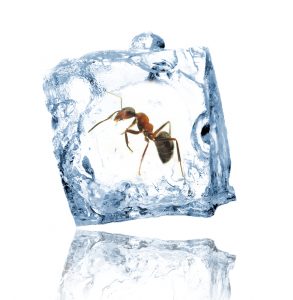LET’S HOPE OUR INSECT PESTS ARE FREEZING, TOO!
By Chris Williams on January 15, 2018.
Yes, it seems like it’s already been an extra cold, extra snowy winter, and we’re just getting started. With this kind of weather, we always hear hopeful comments from customers something like, “Won’t this mean a lot fewer mosquitoes (…or ticks, or yellowjackets, etc.) next year because the cold will have killed them?” You would think so, wouldn’t you?
It’s simply not that black and white. So many variables come into play, from the type of insect or tick or spider, to the way it chooses to spend the winter, to the degree of cold, to the length of time the insect was exposed to the cold, and so on. Some insects spend the winter in the egg stage, some as immatures or adults hidden under bark, or deep in leaf litter, or even under your siding or in your attic! It makes sense that the insect’s “overwintering” stage would be the life stage most resistant to cold.
INSECT “ANTIFREEZE” WARDS OFF THE COLD
Some insects have no problem with the cold because they have built-in antifreeze and can even enter a semi-hibernation state for the duration. For example, mosquitoes that overwinter actually replace part of the fluids in their bodies with glycerol. This natural “antifreeze” reduces ice formation in their tissues and allows the body to reach a much lower temperature before actually freezing.
Although the dynamics are complicated, apparently insects can withstand very cold temperatures if temperatures drop gradually, but it’s a rapid drop or repeated freezing and thawing that can kill them. Snow cover is actually a positive thing since it provides an insulating blanket for those insects or arthropods hiding on or under the ground.
RECENT INVASIVE SPECIES MISS THE TROPICS!
The insects most likely to be affected by extreme cold are probably those that we call “invasive species.” Some of our newer pests such as the brown marmorated stink bug or the Asian tiger mosquito moved into this country from warmer, more tropical regions and are not fully adapted to our weather extremes. They’re more vulnerable to cold.
The fact is that a very mild winter can mean more bugs than usual in the spring, but it seems that a very cold winter doesn’t really make any noticeable difference in the numbers of the insect of your choice in the long run. It helps that insects are highly adaptable with a high reproductive potential. Even if a large percentage of the population dies as a result of a harsh winter, if the following spring and summer are favorable, those missing individuals will be replaced in no time.
For more on how winter affects insects, see these Colonial blogs:
- How Do Insects Survive Our New England Winters?
- Snowy Weather Might Mean More Indoor Pests
- What Happens to Indoor Insects in Winter?